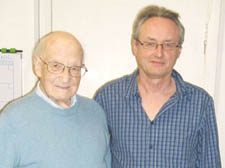|
|
 |
| |

Marigold co directors David Swinstead and Patrick Tobin |
Taking stock of organic flavouring
Don Ryan finds out why ‘fresh and natural’ foodies are endorsing a manufactured product
ENLIGHTENED shoppers will know the name Marigold. Three million tubs of their bouillon powder were sold last year.
Marigold is hip. Among its many advocates are Nigella Lawson, Delia Smith and this paper’s Clare Latimer.
Normally supporters of all things fresh and natural, these chefs have no qualms about recommending this manufactured product and promoting it as an excellent ingredient for making soups and casseroles.
Marigold is a local brand – its centre of operations is tucked away in a large warehouse, behind King’s Cross station, where it moved 25 years ago from a small shop in Hampstead.
Patrick Tobin is co-director and marketing manager of Marigold. The London-born son of an Irish publican, he has overseen Marigold’s slow but steady growth since 1980.
In the early days he drove the company’s sole delivery vehicle. Now, he tells me, a fleet of 17 large refrigerated vans fan out daily, covering a 60-mile radius around London.
Refrigerated vans for bouillon powder? The famed dried stock is only a small part of the Marigold operation, Patrick explains. When taken around the warehouse with its giant chilled room, my eyeballs almost suffer a hernia, trying to take in the sheer scale of the operation.
I soon learn that Marigold is at the heart of the revolution that is altering the food shopping habits of London’s more affluent residents. The shelves and display cabinets of the numerous delis and natural food shops currently opening all over this city are crammed with produce supplied by Marigold vans.
Their price list runs to 80 closely typed A4 pages listing around 4,000 individual products from almost 500 mostly small companies and co-operatives, only a few of whom will be known to main stream supermarket customers.
Fresh, natural and often innovative is an accurate summary of the produce on show. There are butters, cheeses and many other fresh dairy goods, including vegan milk, together with a large range of fruit drinks, preserves and honeys, and all sorts of teas including Red Bush, the brew that fuels the No.1 Ladies’ Detective Agency in Alexander McCall Smith’s books, now dramatised for TV.
Innovative commodities include Grasshopper instant organic porridge pots (just add hot water and eat); Conscious Chocolate bars (raw, vegan, handmade and sugar free); Skyr.is (a traditional Icelandic low fat, high energy, yoghurt type product, which achieves its low fat status naturally and consequently does not contain a bulking agent or any flavour enhancers).
Marigold Health Foods grew out of a number of projects its founder, 90-year-old David Swinstead, was involved in back in the early 1970s. He introduced vegetarian cheese to a public that thought all cheese was vegetarian. He also discovered the Swiss bouillon powder that was to carry the Marigold brand and win countless accolades from discerning cooks across the globe.
The product is still produced by the same original Swiss company to Marigold specifications. Whereas most rival bouillon preparations embraced or were the result of scientific progress, David and Patrick have stuck to the original ingredients and keep theirs natural.
Their business approach too, harps back to an older, less cynical tradition of commerce.
I had assumed that the celebrity endorsements were the result of a sharp marketing strategy.
“What’s the story with the celebrity endorsements?”, I asked.
“There isn’t one” replied Patrick. “Delia, Nigella and the others came across Marigold without any help from us. All we do is run the business; a steady stream of small producers come and visit, and if we like the product, it goes on the list and hopefully the retailers will order”.
Like the goods they supply, Marigold, it appears, has grown naturally, without too much help from modern methods. |
 |
|
|
 |

|
|
 |
|









